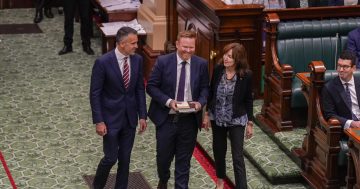The Bridge* discusses recent research into how expert public servants are treated.
 Politicians need expertise to make public policy and public servants are one of the principal providers of knowledge.
Politicians need expertise to make public policy and public servants are one of the principal providers of knowledge.
Yet what constitutes relevant knowledge and skills for bureaucrats is regularly contested—both by politicians and bureaucrats.
An article in Public Administration analyses the politics of bureaucratic expertise.
It proposes the concept of ‘expertise bargains’ to capture the dynamics between politicians and bureaucrats.
Understanding expertise bargains
The article proposes a framework to analyse the politics of bureaucratic expertise that builds on the public service bargains model.
This model centres on the idea that public administration rests on explicit or implicit understandings—bargains—between public servants and those they serve including politicians, citizens and clients.
These bargains can be:
- formal: codified in constitutions or regulations.
- informal: based on unwritten conventions.
A public service bargain involves an exchange between politicians and bureaucrats, and the main elements of this exchange are competencies, loyalty, responsibility, and rewards.
In expertise bargains, bureaucrats offer politicians some form of knowledge or skills in exchange for some degree of administrative responsibility and discretion.
The article uses expertise to refer to a range of different knowledge and skills that bureaucrats possess.
Expertise bargains vary along three dimensions:
- How much weight is placed on bureaucrats’ expertise compared to their political loyalty.
- Some bargains will place bureaucrats’ expertise over their loyalty to the political class while others will value loyalty over expertise.
- Expertise bargains differ in the kind of qualifications, knowledge, and skills expected of bureaucrats.
- The degree of autonomy and responsibility granted to bureaucrats in exchange for this expertise.
Changes in expertise bargains
The article argues the role of expertise in bureaucracies is regularly contested by politicians and bureaucrats.
This sets in motion a process of political and administrative reactions that can change the nature of the bargain.
Expertise bargains can be destabilised both by political and bureaucratic action.
The legitimacy of bureaucratic expertise with politicians depends on its ability to help politicians achieve their goals.
Existing bargains can be jeopardised if politicians no longer see the knowledge offered by bureaucrats as relevant for solving problems.
External shifts can cause dissatisfaction with existing bureaucratic expertise such as a change in government or a major crisis.
Devaluing bureaucratic expertise can lead to altering the existing bargain.
This can include:
- reducing the responsibility and discretion of bureaucratic experts by reversing delegation or strengthening control
- abolishing or defunding agencies
- replacing existing bureaucratic experts with other types of experts
- seeking alternative sources of expertise
- creating competing expert bodies inside or outside the bureaucracy
Expertise bargains can also be destabilised by bureaucratic action.
External shifts may lead bureaucrats to pursue strategies to revise expertise bargains.
For example, they may seek to alter type of expertise in the bureaucracy by favouring particular types of qualifications in recruitment or by setting up specific organisational research units.
Responding to change
Political and bureaucratic action can be met with different responses ranging from acquiescence to compromise to rejection.
For example, if politicians bring a new type of expert into the bureaucracy, existing public servants may: refuse to accept the new expertise; co-exist peacefully; or they may acquiesce to the new experts.
Conversely, new forms of knowledge promoted by bureaucrats can either be embraced or rejected by politicians.
If action to change the bargain is sustained over a long time, this can overcome the initial resistance and lead to the formation of a new bargain.
For example, a political party that remains in power for a long period can gradually bring an initially sceptical bureaucracy around to accept a new expertise bargain.
Similarly, sustained bureaucratic efforts to change the bargain that meets initial political resistance may have more success with the following government or may gradually be embraced by political leaders.
By contrast, if action to revise the bargain is short-lived, resistance is likely to thwart the formation of a new bargain.
For instance, a political party that is in power for a short period may see its attempts to revise the expertise bargain sabotaged or ignored by resistant bureaucrats.
Similarly, short-lived bureaucratic efforts to change the bargain may easily be ignored by hostile political leaders.
The bottom line
Bureaucratic expertise is shaped by the interplay of political and bureaucratic action with politicians and bureaucrats mutually defining the role of expertise in the state.
Bargain change can be the result of either environmental changes or strategic action.
The success of political and bureaucratic strategies to change the bargain depends on the response from the other party.
Success also depends on how sustained these strategies are.
Want to read more?
When bureaucratic expertise comes under attack – Johan Christensen, Public Administration, December 2022
Each fortnight ANU’s *The Bridge summarises a piece of academic research relevant to public sector managers.
This article first appeared at anzsog.edu.au











